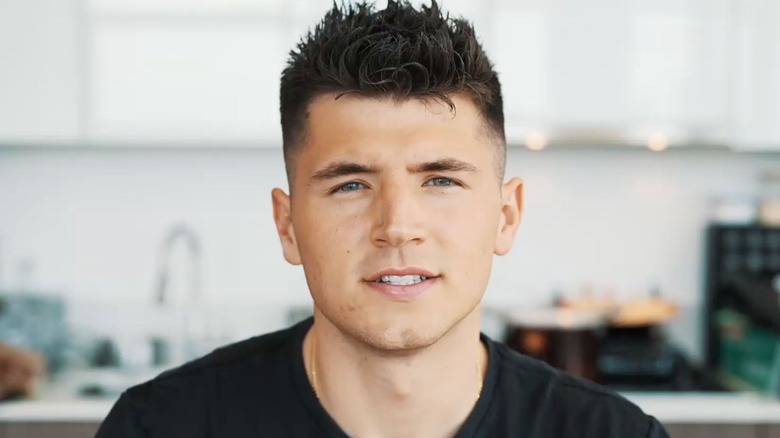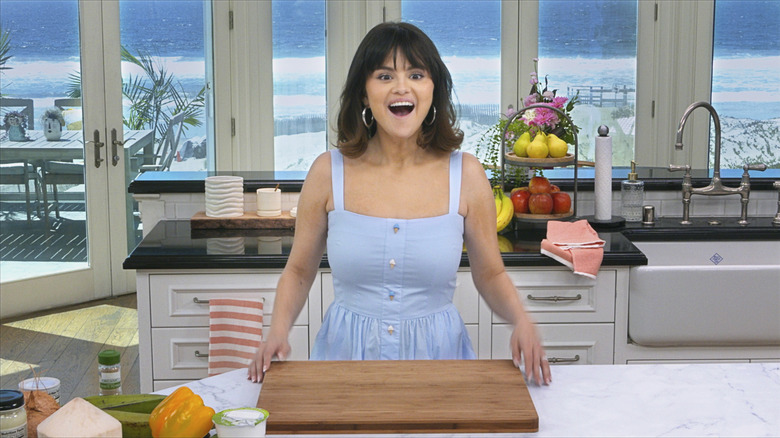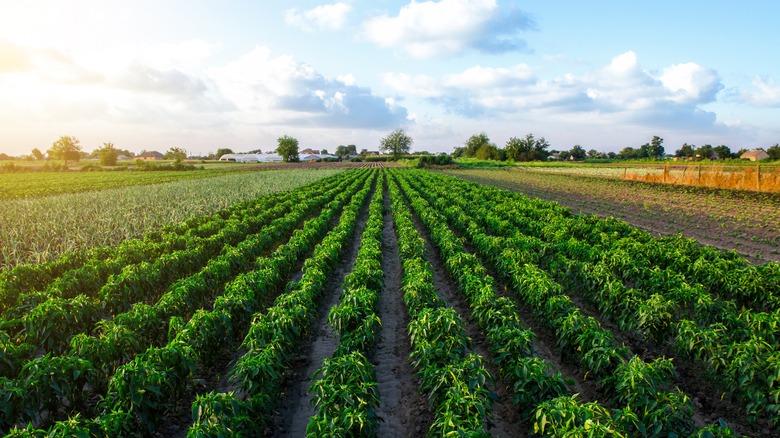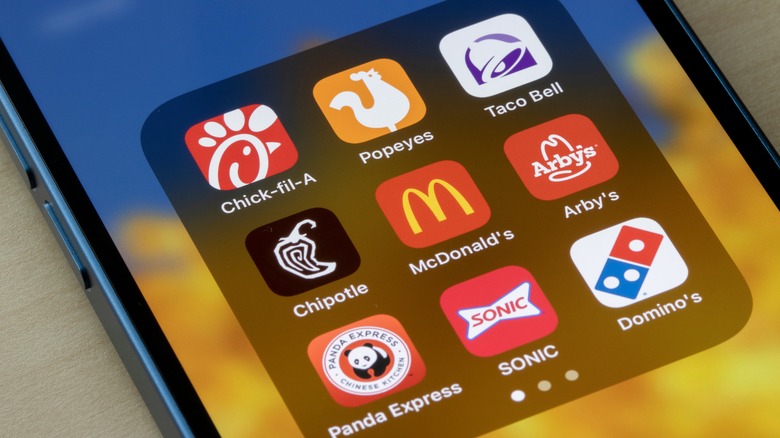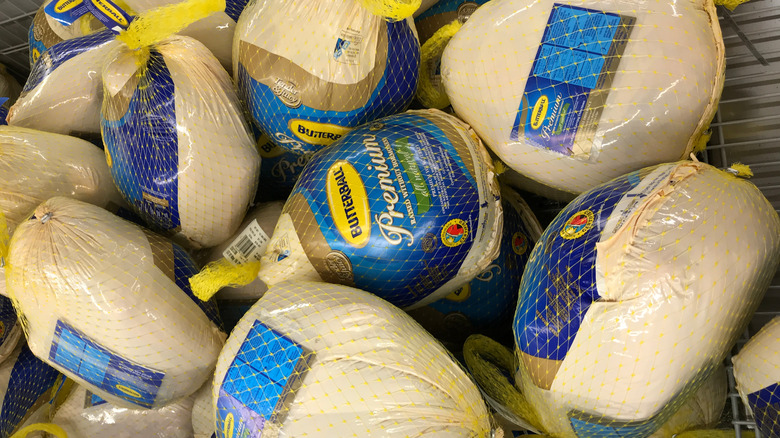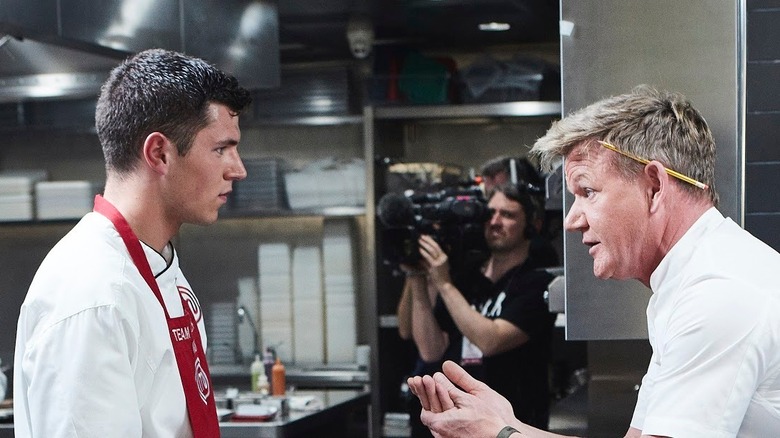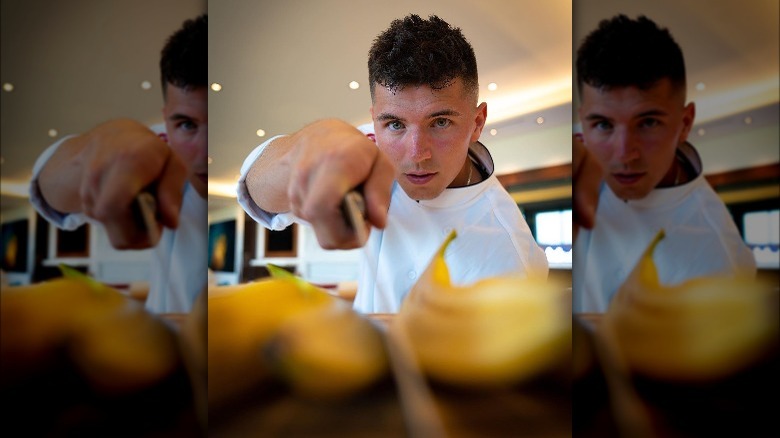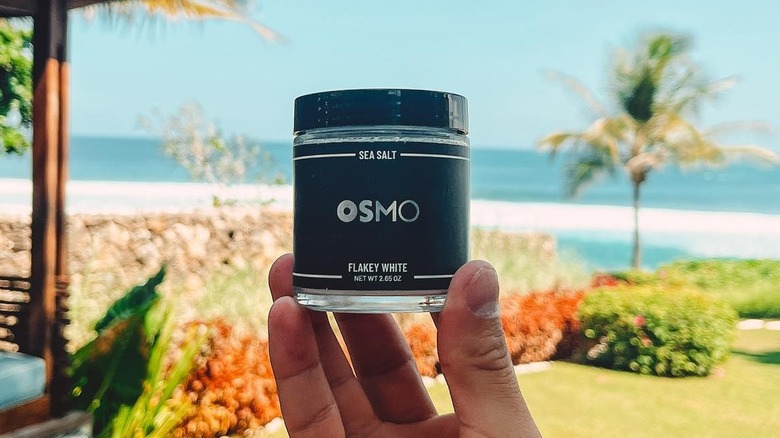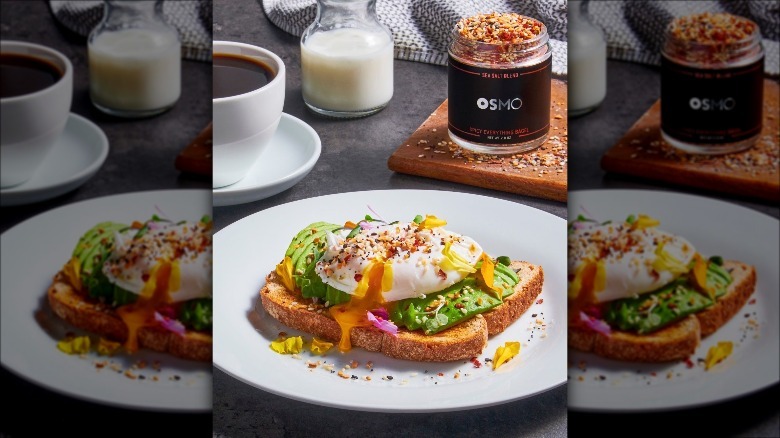Nick DiGiovanni Talks Getting Cheesy With Selena Gomez - Exclusive Interview
If you know your way around food TikTok and Instagram, then you're probably very familiar with Nick DiGiovanni. The social media star, who also happens to be the youngest finalist in "MasterChef" history (via WBZ), draws massive virtual crowds for his fun videos featuring fast food copycats, creative and playful original recipes, and other fun food-filled adventures. And that's not all he's up to these days. DiGiovanni joins Selena Gomez on the latest season of her HBO Max cooking series "Selena + Chef," and let's just say he's wheeling out one of his most snap-worthy recipes yet.
In an exclusive interview with Tasting Table, DiGiovanni dished all about his experience cooking with Gomez — which included an 80-pound wheel of cheese we might add — as well as his most recent feat: breaking another Guinness World Record. Plus, the young chef discussed his passion for fighting food waste and how he hopes to keep on learning, keep using his platform, and keep having fun.
Why Nick DiGiovanni took a big risk on Selena + Chef
What was it like filming a virtual cooking show and cooking with Selena Gomez?
Really, really fun. I think it's interesting because cooking is naturally a very hands-on experience. You might think that it would be very difficult doing something like that over Zoom or over a video call, but I found it to be really fun. It felt like Selena and I were there in the kitchen together, so it actually was great.
And you went in really, really ambitious in your recipe for her. What inspired you to decide to involve a giant wheel of cheese in this process?
I just think that's a very big ... It's got that wow factor. Who doesn't want to see a whole giant Parmesan wheel? We all know Parmesan cheese and to see it come out of its original form in the wheel like that is really, really cool. I thought it would be such a fun thing.
And the other thing is, I'd opened probably three or four before doing that one with her. So I was pretty comfortable and confident in the fact that I could talk her through opening it. But the only tricky part there, of course, was the idea that she actually might not be able to get it open, as someone who, one, doesn't even really cook that much and, two, is being suddenly hit with this massive wheel that is necessary for the recipe to get in there. So it was ambitious, but it was great.
The bigger question I have is, now what are you going to do with all of that cheese that you have?
Very good question. I always freeze it and I try to give a bunch to my neighbors. Yeah. I pretty much just give it away now. I don't even keep it for myself anymore because ... people don't understand how much cheese is really inside an 80-pound wheel of Parmesan. It is enough cheese to probably last you a couple years.
Should we try this at home?
I would recommend against it. What I would say is try to get your Parmesan cheese from as close to the source as you possibly can, but the cheese wheel is not for everybody. Because if I'm being totally honest, I mean, it's hard to preserve that much cheese and have the last little bits taste as good as they do early on over time. Right? So I think it's actually a lot better if you're not using it in crazy quantities like that, to just buy a few big hunks and then use them that way, because it changes the flavor over time.
Nick DiGiovanni is supporting sustainable farming
Tell us a little bit more about the charity that you chose to highlight during your episode.
So my charity was [The Farmlink Project] and I've been working with them for a while now. Basically, this was started during Covid by mainly a bunch of college kids, or college-aged kids, I should say. It is really interesting because it's probably the one business in the world whose goal is to put themselves out of business in the sense of, we're basically trying to end food waste.
It's a really big problem to be trying to tackle, but the idea is, essentially, that we can move this excess from farms that might otherwise be wasted, or ugly produce that isn't pretty enough to be sold on shelves. And we can essentially pay farmers fair prices for this and move it to food banks and to people that really need it. And so, yeah, it's a really, really fantastic cause.
I studied environmental science in college. One of the biggest drivers is food waste and about a third of all food produced eventually goes to waste in some form. And so it is a massive, massive problem. And this is a really great solution.
How to break a fast food world record, according to Nick DiGiovanni
I saw that you recently earned another Guinness World Record, this time for the most fast food restaurants visited in 24 hours. What inspired this?
We actually just got confirmed for the record today, which is great. They went through all of our info and confirmed it basically. That's our third world record. We have so much fun doing them. People love watching them. And I think the whole concept, the whole mindset behind that is basically ... It's very, very time-consuming and logistically complicated and expensive to attempt a world record. And a lot of people that attempt, they don't even pass. And so we always try to look at what's the cost-benefit analysis. Is this one going to be worth it? Can we actually do it?
And so the fast food restaurants one was something we thought would be great because I go around to fast food locations all the time for videos. I recreate it. I enjoy it. In some instances, I definitely enjoy certain fast food items. And so that part of it felt very authentic.
I'll say to wrap up here, the record itself turned out to be very physically demanding, just getting around on foot. Because that was part of the rules basically is using public transit or getting around on foot. We walked probably eight and a half miles or so, and it was really tiring. So worth it, but tiring.
So you had to do this on foot and you guys decided to do it in New York City?
Yeah. I mean, it was the only place we could really do it because there was no way we were going to do something like that in any other state that I really know of, where you have that much congestion of fast food places all in one place, that concentration of fast food spots at once.
How many did you make it to in order to break the record?
So, the record to beat was 50. And we ended up going to 69. So it was a whole day. It was a lot of work.
Nick DiGiovanni reveals his next Guinness World Record attempt
Did anything crazy happen? Did you think you weren't going to break the record?
We did. We got stuck in an elevator halfway through the day. It was a packed elevator and we were going down through this mall and we were feeling really ... This is like, when we're feeling the best, because we had just hit five or six in the matter of a few minutes in this big shopping mall. And then we're going down to another floor that had even more and we're like, "Oh, we got this in the bag. We're great."
And then we were all feeling so confident and I think that was what got us, because all of a sudden this elevator stops and we were like, "You gotta be kidding me. This is really, really bad." And it got really hot in there and people started taking their clothes off. It was getting a little weird in there and then thankfully, it suddenly lowered us to the lobby and we got out.
That's hilarious. I mean something has to go wrong, right?
Yeah. When we started getting too confident, I was like, "Oh, this could be bad." I think we started getting too confident and then that was our wake-up call.
Do you guys have any more records in mind that you plan to try to break soon?
Yeah. We are going to try to donate the most turkeys ever donated in 24 hours for Thanksgiving, so that's coming up. That will be a challenge, but that will be a fantastic record to try to beat. There are definitely a few others on the horizon, although we are in that process right now, of figuring out what we can realistically afford to actually do. Because again, it gets really pricey for these. And trying to figure out just what will people enjoy seeing and what will we enjoy trying to do. So we're juggling a few, but I think the turkey one is pretty set in stone.
The best advice Nick DiGiovanni received from Gordon Ramsay on MasterChef
You're the youngest "MasterChef" finalist ever. What was it like competing against chefs that were so much older? And a lot of them had much more experience than you did going in.
I really enjoyed it. I've always been somebody that ... I have a very wide range of friends in life for one reason or another. And so I have friends that are a couple of years younger than me — I recently turned 26 — and then I have friends who are in their mid to late 50s who have a couple kids who are my age.
And so actually being around a bunch of people that were mostly older than me, I enjoyed in that sense. And I ultimately just took the entire experience as a learning experience and just tried to pick up what I could from these other people. I looked at the whole thing as a learning experience where I just sort of went all out on my own and just said, "I have nothing to lose here. Let's just cook and have fun and see where it leads."
What was the most important thing that you learned from Gordon Ramsay?
I think just not being afraid to break the rules in the kitchen. And it seems a little bit cliché. But when you have a chef that's as world-renowned and respected as he is, I think to hear that and get that message from them, it's great because then you figure, okay, I can just go. I don't have to be worried. I don't ever have to think twice about trying to bend the rules in the kitchen or with food anymore, because if somebody like that appreciates it, then you'd hope that you're on the right track
Nick DiGiovanni wants to help fight food waste
Speaking of bending the rules, after the show, you finished school with your major in food and climate. How do you see that focus impacting your career path?
I'm already trying to do a lot in that kind of realm. And so I think it'll just come down to using this platform that I'm grateful enough to have to try to do things like that. I look at the position that I have right now and what I learned in college and it all makes sense in the sense that ... Of the top five things that are most harmful and impactful to the environment, at least two out of those five things, or two or three even, are very, very directly related to food, with the biggest one being food waste. And so the fact that I am in a position to potentially influence that, even if it's just a tiny, tiny bit is great, because I think there's going to be opportunities everywhere.
So I think Farmlink is just a start for me. I'm going to look everywhere I can to see how I can get the word out on that stuff more, because it is really important. Yeah, I'm in a lucky position to actually do something about it.
Do you have any sustainability-minded kitchen or cooking tips that you use at home or that you can share with our readers?
That's a good question. I would say 99% of the food or the things that come into your kitchen can be used in some way. And I mean that by saying, a lot of the scraps or things that people might throw out are things that a chef in a kitchen probably uses in some way. As a last resort, if you can't use these different scraps that you have in your kitchen in some other way, just freeze them all and then use them for some sort of stock.
There are ways to utilize every single ingredient out there. I rarely feel like I come across anything where you really truly have to throw it out and just can't repurpose it. So I would say that. It's a great start. If you're able to get your home kitchen to zero waste by just utilizing everything, every single scrap that comes across your cutting board, then that's already a really good start.
Nick DiGiovanni explains why salt is his favorite kitchen ingredient
You're apparently also an expert in salt. What are some of your top tips or things to keep in mind when it comes to cooking with salt?
Yeah. I do love salt. The reason I did create Osmo is because I looked at salts that existed and I felt like it just wasn't very exciting for something that we quite literally use every day. Nobody ever questions why we just put salt and pepper on everything, we just do it. It's on every table and we're just taught, you just put salt and pepper. And so I figured, okay, I'm going to dive a little bit deeper into this and try to figure out how I can make it more fun and more exciting.
I mean, salt is a very, very important thing with food. I feel like in some cases, it's overused, but then there's a lot of areas where it's underutilized. And I would say, one single example is anytime you use tomatoes, the first, first, first thing I do as a chef every single time is I sprinkle some salt on those tomatoes. Because immediately that salt begins really, really drawing that flavor, these bubbles of flavor and moisture out of the tomatoes. And if you sit there and you watch, you can see these little bubbles pop up. And that is just tons and tons of tomato-y flavor that most people don't take the time to salt and don't actually draw out. So whether I'm having a burger with a tomato on it, or it's a salad, or whatever it might be, a caprese salad, a BLT, whatever it is, I always, always, always just go ahead and I salt my tomatoes.
And so, I mean, [salt] comes into play for so many things. I like eating my salmon with crispy skin. And if you put a little bit of salt on the skin, you start drawing out that moisture to help get a [crispy skin]. Or on a steak is probably even more applicable. It's drawing out the moisture. And then it allows you to get that nicer crust on your steak. And so salt does so many different things.
What type of salt is your go-to in the kitchen?
I would say if I just had to pick one, I would pick a very fine, white, flaky salt that, one, would have enough texture to stand on its own and use from a texture standpoint, if you want to use it that way, but also isn't so big, like those Maldon flakes, which frankly, I feel like are almost too big for many purposes. You can't put those on a steak and sear a steak because it will be all bumpy and won't sit flat on the pan. And so I think having that fine balance between a flaky salt, but one where the crystals aren't too big is that perfect balance.
Nick DiGiovanni's favorite flavored salt
You guys have a lot of flavored salts at Osmo, too. Do you have any favorite salt or ingredient pairings?
Yeah. I would say my go-tos are definitely black truffle. The roasted garlic is ... If you like garlic, it's insane. It is literally just fresh oven-roasted garlic, combined with salt. It's a ridiculous, ridiculous flavor. And so that's really good.
The thing I do love about the salts ... They're certainly more expensive than if you just go buy a salt off the shelf at a store, but it's because we're spending a lot to make them and they come from all over the world. And so yeah, I would say the black truffle and the roasted garlic are two of my favorites ... and the Mesquite smoke.
I hate when you get some food items, it might say a flavor on it, and then it just doesn't [have it], it tastes artificial, or it tastes [artificial]. But all of those things we're getting from the actual real thing. It really is good stuff.
What's the weirdest thing you're putting salt on now?
Oh man. People put salt on all sorts of stuff. Weirdest thing I'm putting salt on? Ah, man, I don't even know.
I guess nothing's off limits for you at this point in time because nothing's too weird to put salt on.
I don't think so. I mean, I feel like it used to be such a strange concept to put salt in ice cream or on for instance, a salted caramel ice cream that was actually flavored, had the flavor of salt, or on chocolate. And now it's become such a common thing to use it in so many different ways. So I feel like nothing's off limits now.
Catch Nick DiGiovanni on the fourth season of "Selena + Chef," now streaming on HBO Max.
This interview was edited for clarity.
